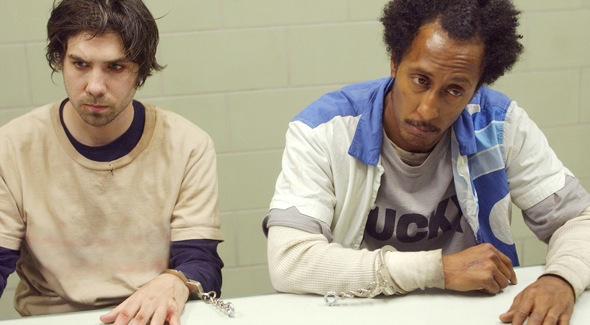“The Wire” was the first show
to give equal time to the lives of drug addicts and drug dealers. While these characters are not always sympathetic, their motives become understandable as we are witness to their humanity. Of equal emotional impact is the frightening expose of the bureaucracy that constantly hinders the men and women in blue from doing their jobs. The police officers and detective squads spend almost as much time battling their stat-obsessed
superiors as they do the criminals, hence the city government poses
just as great a threat to Baltimore’s
citizens as the addicts and dealers that haunt its corners.
Corruption is endemic on both
sides, and real change is always stalled, leaving the cops and crooks forever stuck in
a vicious cycle. The names change, but
the game goes on. "The Wire" is eminently quotable as every scene is suffused with memorable dialogue, but one of the most
prophetic exchanges of the entire series occurs in the very first episode. Two detectives are discussing the failure of
the war on drugs and one says: “You
can’t even call this a war!” When his
partner asks why, he responds: “Wars
end!”
Truer words.
Truer words.
The quality of the writing is
outstanding and the actors inhabit
their roles so completely that you can’t help falling in love with all of the characters, even the ones who are hapless fuck-ups.
For the cops, Jimmy McNulty is the clown prince. When he’s working a case, McNulty is natural po-lice, but without a trail of clues to keep his demons at bay, Jimmy is a
useless drunk. His marriage is a
shambles, and all McNulty’s detective skills do not avail him in understanding
his ex-wife’s mistrust and resentment.
D’angelo Barksdale is nephew to
the reigning gangster king of the projects. He has more smarts than the average
slinger, but D'angelo also has more heart, and so he rankles at the ruthless manner in which the game wastes
so many young and occasionally innocent lives. D'angelo's
conscience clamors to be heard, but the corner ain’t no place for feelin’s. However, when one of his own crew is callously clipped,
D’angelo must choose to either stay in the game and remain silent, or to court certain death by speaking out.
Beyond the story and
characters, the construction of the entire series is breathtaking. Whether the issue is drug addiction, the collapse of
once-thriving industrial centers, political corruption, the broken educational system or
media skew, each season builds upon the previous one and expands the perspective on the myriad of problems that Baltimore faces. As the view grows ever larger, the seemingly microscopic moves made by the
humans trapped in this concrete cage seem trivial, yet there is still heroism to be found here.
Season 2 switches locales to Baltimore’s dying sea ports and reveals how drugs and other
contraband are able to enter the city so easily and in such massive quantities. The stevedores union has been shrinking rapidly,
and millions are needed to dredge the canal so that more ships can dock and
create more jobs. The union captain Frank Sobotka has made desperate choices to keep
his men working, and in doing so Sobotka has cast himself adrift on amoral seas. The lure of easy money was too seductive to resist at first, but a horrible human tragedy on his docks forces Sobotka to finally confront his culpability, though the cost may be fatal.
Season 3 examines how the
high-level drug lords use their money to influence local politicians through
campaign contributions. These secret connections
ensure that no police inquiries are allowed to follow the trail of dirty money back to anyone's mansion. The
narcissism and cold-blooded treachery of the street is mirrored in the boardroom
as the local government officials scheme and backstab their way to another term
and another payout. Collateral career damage is mercilessly meted out, and the survivors allow no quarter and offer no apologies. The game is the game.
Season 4 is pure heartbreak,
as the overburdened and under-budgeted Baltimore school system struggles to offer inner city
children a chance of escape through education.
However, the high school hallways echo jail corridors in their random explosions
of violence. There are too few teachers for too many kids with too many problems. The students quickly learn that you’re better off packing a
gun than a textbook, and the local gangs easily find freshman applicants who would rather risk their lives in the game
than in the classroom.
The fifth and final season of "The Wire" is the closest to
creator and writer David Simon’s heart, for it focuses on the newspaper industry
and how print journalism is foundering in the wake of the internet and 24-hour news
channels. Simon was a police reporter
for the Baltimore Sun who embedded with local police, so he saw which stories got printed and
which ones got buried. Political corruption has deep roots, even in the newsroom. Aspiring local candidates are able to indulge in spin and censorship to preserve the façade of their campaign
promises while the reporters and editors struggle with how much truth they can publish.
There are no
resolutions. No lessons learned. “The Wire” goes dead
without revealing any answers.
Instead, this superlative series etches into the stone of our psyche the most damning document of the evil that we do to each other. One might think that such a chronicle would be a crushing downer, but I own the series, and upon every viewing the experience is exhilarating. The veracity of "The Wire" and its unwavering power to confront us with the truth of human nature is an affirmation of our duality.
We all have the capacity for generosity or atrocity, but it is our life experience and our choices that most influence the path we tread. Yet sometimes doing what is right is not enough. Even if the intentions are good, the outcome rarely results in any permanent respite from the grind of the game. The struggles of a valiant few may be vain, but at least we can admire their efforts to make the world a little better, even though they will likely not share in the reward.
We all have the capacity for generosity or atrocity, but it is our life experience and our choices that most influence the path we tread. Yet sometimes doing what is right is not enough. Even if the intentions are good, the outcome rarely results in any permanent respite from the grind of the game. The struggles of a valiant few may be vain, but at least we can admire their efforts to make the world a little better, even though they will likely not share in the reward.














No comments:
Post a Comment